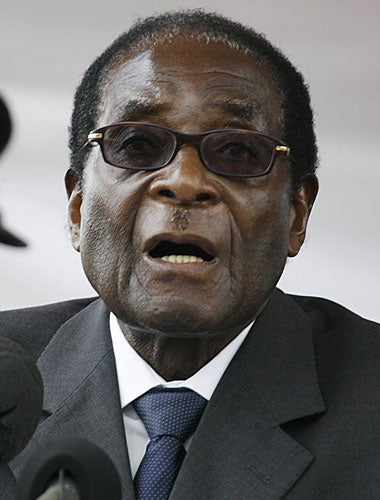Mugabe 'to hold talks with rival'

Your support helps us to tell the story
From reproductive rights to climate change to Big Tech, The Independent is on the ground when the story is developing. Whether it's investigating the financials of Elon Musk's pro-Trump PAC or producing our latest documentary, 'The A Word', which shines a light on the American women fighting for reproductive rights, we know how important it is to parse out the facts from the messaging.
At such a critical moment in US history, we need reporters on the ground. Your donation allows us to keep sending journalists to speak to both sides of the story.
The Independent is trusted by Americans across the entire political spectrum. And unlike many other quality news outlets, we choose not to lock Americans out of our reporting and analysis with paywalls. We believe quality journalism should be available to everyone, paid for by those who can afford it.
Your support makes all the difference.Zimbabwe's main opposition leader today said he is to meet with President Robert Mugabe in the next week to try to resolve their crippled country's political impasse.
Morgan Tsvangirai that he hoped for results despite the Mugabe regime's beating and detention of opposition supporters and attempts to violate a power-sharing deal that has been stalled since September.
Tsvangirai said his Movement for Democratic Change was committed to the deal, which calls for him to take the new post of prime minister and the 84-year-old Mugabe, in power since independence in 1980, to remain president.
"We have to deal with him," Tsvangirai said at a news conference in neighboring South Africa. "It doesn't mean that I trust him wholly.
"I regard Mugabe as part of the problem, but also part of the solution."
Tsvangirai said he had requested a meeting through South African President Kgalema Motlanthe, who is the current head of the main regional bloc, the Southern African Development Community. The bloc oversaw the negotiations that led to the power-sharing deal.
"There is a scheduled meeting which has been confirmed through the office of President Motlanthe," Tsvangirai said. He would not say exactly when, but said it would be in the next week and that he was returning to Zimbabwe Saturday.
The South African president's spokesman could not immediately confirm a meeting had been set. Attempts to reach Mugabe's spokesman were not immediately successful.
Tsvangirai has been out of Zimbabwe since Nov. 10 in a now resolved dispute over the Zimbabwean government's failure to issue him a passport. The passport dispute had illustrated the deep gulf of mistrust between the two men who are expected to lead their country together out of its economic and political morass.
The power-sharing agreement has stalled because Tsvangirai accuses Mugabe of trying to keep too many of the most powerful Cabinet posts, including the ministry in charge of police accused of harassing dissidents. Tsvangirai said that must be resolved before a unity government can be formed.
Tsvangirai also wants the release of supporters and peace activists accused of what he called "trumped up" charges of plotting to overthrow Mugabe. And Tsvangirai says his powers as prime minister must be clearly defined and enshrined in the constitution before he can govern with Mugabe.
"We will only be in a government which has the potential to be functional," Tsvangirai said.
Increasingly, though, questions are being raised in and outside Zimbabwe about whether Mugabe would sabotage a unity government.
Britain and the United States in December said they would not support a coalition that included Mugabe. The new British and U.S. stance presents the possibility the unity government would be denied crucial aid and international cooperation.
Zimbabwe's state media, meanwhile, has hinted Mugabe would name a government unilaterally by the end of this month. He already has made several unilateral government appointments that Tsvangirai said Thursday he regarded as illegitimate.
"We have been in a struggle for these last 10 years," Tsvangirai said Thursday. "We have met so many frustrating moments. Should this deal collapse, the MDC will have to find alternative ways of continuing the struggle."
Zimbabwe is suffering a humanitarian crisis and economic meltdown amid the political impasse. Acute shortages of everything from medication and food to fuel and electricity has devastated basic services.
A cholera outbreak that has spread because of Zimbabwe's crumbling health care system and water supply infrastructure has killed 2,106 people since August, and the United Nations has said half the population faces imminent starvation.
Zimbabwe also faces chronic shortages of local money and the world's highest official inflation. Teachers, doctors and nurses want to be paid in foreign currency, and even state newspapers and the Zimbabwe soccer federation have asked to be able to charge in hard currency.
Join our commenting forum
Join thought-provoking conversations, follow other Independent readers and see their replies
Comments